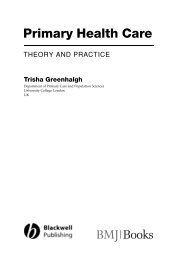Download File - JOHN J. HADDAD, Ph.D.
Download File - JOHN J. HADDAD, Ph.D.
Download File - JOHN J. HADDAD, Ph.D.
You also want an ePaper? Increase the reach of your titles
YUMPU automatically turns print PDFs into web optimized ePapers that Google loves.
38 Levey<br />
tumor is surgically removed. In other models, improvement in overall survival and<br />
reduction in the metastatic disease burden in lungs were observed. Animal models<br />
included those for breast, liver, and bladder cancers (19,20,59–65).<br />
Lymphoma-Derived Immunoglobulin (Idiotype)<br />
Idiotype is the unique antigenic portion of the immunoglobulin produced by<br />
cancerous B cells, such as those found in lymphomas and myelomas. The idiotype<br />
protein itself or the DNA encoding the idiotype have been used as experimental<br />
autologous vaccines to generate immune response against the specific cancer from<br />
which the protein or DNA were derived.<br />
In rodent models of established lymphoma and myeloma, a variety of<br />
idiotype vaccine approaches have demonstrated significant survival benefit.<br />
Generally, optimal efficacy has been achieved using the specific idiotype protein<br />
or encoding DNA in combination with other nonspecific immune modulators<br />
(e.g., IL-2, IL-12, GM-CSF, Flt3 ligand) or cyclophosphamide chemotherapy. In<br />
some studies, dendritic cells pulsed with the idiotype protein were used to treat<br />
mice as a form of cellular immunotherapy (21,66–69).<br />
DO THE PRECLINICAL STUDIES PREDICT OUTCOMES<br />
IN HUMAN TRIALS?<br />
In the clinical setting, a number of studies have tested many of the same personalized<br />
vaccine approaches described above in patients with melanoma, colon<br />
cancer, non–small cell lung cancer, and lymphoma (Table 2). Among these were<br />
two randomized, controlled trials where efficacy findings can be interpreted<br />
Table 2 Examples of Clinical Activity in Patients Treated with Autologous Cancer<br />
Vaccines: Effect of Tumor Burden on Outcome<br />
Treatment Indication Comments Reference<br />
HSPPC-96<br />
(Oncophage 1 /<br />
Vitespen)<br />
Stage IV<br />
metastatic<br />
melanoma<br />
(randomized<br />
study)<br />
M1a patients in the vaccine arm 70<br />
survived longer than those in the PC<br />
arm (626 vs. 383 days, P ¼ .177).<br />
Survival was comparable in both<br />
arms for M1b patients (297 vs. 320<br />
days, P ¼ .478), and longer in the PC<br />
arm for M1c patients (299 vs. 226<br />
days, P ¼ .015). Impact of number of<br />
doses was examined using landmark<br />
analyses to correct potential biases.<br />
Patients who received >10 doses of<br />
vaccine survived longer than those<br />
who received PC (478 vs. 377 days,<br />
P ¼ .072).<br />
(Continued)

















